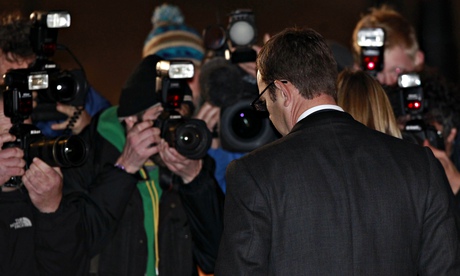
When Nick Davies watched Andy Coulson in the dock waiting to be sentenced last month, he felt a twinge of sympathy for the man whose downfall, among other things, he had worked so hard to achieve. It was the anniversary of the publication by the Guardian of the Milly Dowler story, but that was not what came to Davies's mind. Instead, he recalled the tape recording made by David Blunkett exactly 10 years ago this weekend.
"I remember Blunkett's voice," writes Davies in Hack Attack, his gripping account of the phone-hacking scandal, "full of panic and fear as he pleaded for his privacy; and the sheer mechanical coldness of Coulson as he insisted on his right to convert this man to a headline. I remember all the others who suffered the same fate, left behind like roadkill as Coulson roared off into his gilded future."
It is the heartlessness with which the News of the World and the Sun broke people's lives to push newspaper sales and enforce Rupert Murdoch's writ that is so shocking and why it is now difficult to feel much sympathy for Coulson. Davies might also have remembered in that moment the hypocrisy of the people who worked on those papers, the fact that Andy Coulson, a married man, had a long affair with his boss, Rebekah Brooks (the demonic pillow talk between these two was sadly never properly explored in the court case), and that former News of the World journalists, while setting about their victims in the paper, described some of their own office parties as "a model of drug-fuelled sexual adventures".
One lesson of this book is that when people such as Coulson, the News of the World's news desk editor, Greg Miskiw, or the paper's chief reporter, Neville Thurlbeck, looked in the mirror they suffered not a trace of unease about their behaviour, whether it was straight hypocrisy, lying, bullying or wrecking someone's life. This was not a matter of law but one of morality, and to that degree all the defendants in the recent trial, and many more who were never charged, are guilty of serving a pitiless regime that went unchecked for decades.
This book is important, not simply because it is written by a superb reporter who took on a seemingly invulnerable criminal conspiracy, or because it is, even after Leveson and the months of evidence in court, the best account we have of the phone-hacking scandal and the attendant police corruption and cover-ups. It is, as well, the story of modern Britain and how its standards and politics have been degraded by one man's ruthless acquisition of power. Davies has laid it all bare in an exciting, clear and honest narrative and, even after all that has been written by me and many others about Murdoch, it is difficult not to feel a sense of renewed rage. The board and shareholders of Time Warner, the subject of an $80bn cash and stock offer by Murdoch's 21st Century Fox, would do well to read Hack Attack, if only for the message that the man who says he is for competition is in fact a destructive monopolist.
But Murdoch could not have done it without our help – the audience that tolerated the plummeting standards led by Kelvin MacKenzie at the Sun in the Thatcher years, or the institutions that allowed so much to go unpunished. Parliament, the police and the press regulators were for the most part fearful, supine or just bent and that was why Murdoch came within a whisker of capturing BSkyB and even more influence in British national life.
Quite apart from those inside News International – James Murdoch, the comically brattish son, or Rebekah Brooks, who claimed that the Guardian's coverage "had substantially misled the public" and the affair "would end with the Guardian's editor Alan Rusbridger on his knees begging for mercy"– there were many willing helpers on the touchline: Boris Johnson, a lunching companion of Brooks, who called the Guardian's reporting "codswallop", Alex Salmond, who offered to lobby for the Sky takeover, Jeremy Clarkson, who gave Brooks constant succour, and the rightwing media columnist on the Independent, Stephen Glover, who wrote of Davies that he was "the sort of journalist who can find a scandal in a jar of tadpoles".
The point about Davies and, for that matter, Alan Rusbridger is that they go after really big fish that would terrify Glover – WikiLeaks, phone hacking and the NSA/GCHQ story in just the last few years. Incidentally, Davies is fascinating about what drives an investigative reporter; in his case, it was mistrust of authority after having been hit a lot as a child. Who knows what pushed the Labour MP Tom Watson to stick his neck out, or the lawyers Charlotte Harris, Mark Lewis and Mark Thompson to line up against Murdoch's power and legal resources, which, by the way, Davies believes had a real impact during the trial. They all have something of a rebel streak in them, but also a decent certainty that they were dealing with liars and bullies who had to be stopped.
Hack Attack deserves a lot of praise and success. It is a masterly summary of the hacking affair, as well as the ingenuity and persistence that lead to great journalism. If there is one quibble I have, it is with the subtitle – "How the truth caught up with Rupert Murdoch". Because it hasn't yet. Reorganisation of the parent company, News Corp, following the Dowler revelations caused a 23% rise in the company's share price and an increase of $9.5bn in the family's wealth. Enriched rather than humbled by the scandal, Murdoch reaches for even more power in the United States and it looks as though nothing is going to stop him.

